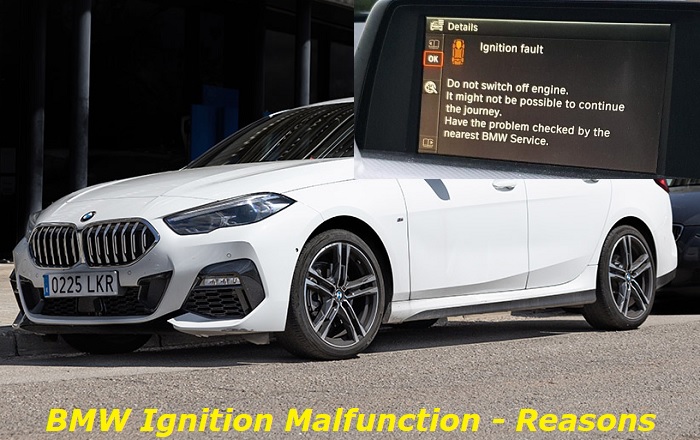BMWs are a go-to option for professionals and smart riders. The vehicle is built to offer riders a smooth on-road experience. However, even vehicles constructed with the highest-quality components will begin to fail if they are not appropriately maintained. A BMW can develop an ignition problem over time. Failure of the ignition coil is one issue that frequently occurs with BMWs.
Ignition malfunction message highlights
- Common reasons:dead starter, dead battery, issues with coils, plugs, or wires
- How to fix:check starter, measure battery voltage, use scanner to check everything else
- Possible consequences:car won't start
- Priority level:High
- Can you drive?No
- DIY repair:Possible but complicated
- Repair price range:$150-$500

Why and how does the BMW Ignition fail?
Ignition coils are a component of the ignition system of BMW. They are responsible for increasing the voltage supplied to the spark plugs from a relatively low level of 12 volts to a much higher level measured in the tens of thousands of volts.
Driving your BMW while the ignition coils are broken might cause harm to the engine or the catalytic converter. The most common symptoms of faulty ignition in a BMW are a pause in the engine when accelerating or a rough idle, a loss of power, misfires, excessive fuel consumption, illumination of the check engine light, and occasional difficult starting.
When you notice an issue with the ignition system, it will be much simpler to identify the malfunctioning component causing the problem. You should take action to prevent damage that will require more expensive repairs.
Symptoms of BMW Ignition Malfunction
- Engine Backfires
There should be zero backfires coming from your engine. The sound you hear results from unburned fuel escaping from your exhaust system, which causes the bang. Even though different things might cause backfires, the ignition coil is one of the most prevalent culprits. If you do not immediately solve the backfires, they may damage the engine, subsequently preventing it from functioning correctly.
If your ignition coil is not functioning, you should make an appointment with a qualified mechanic as soon as possible. If the ignition coil fails to perform its function, the engine will not receive the spark required to start the vehicle.
If you take your vehicle to a trained mechanic, they will be able to inspect the ignition coil to determine if it is broken and give you advice on the best course of action for your BMW. This will ensure that your BMW operates normally and does not cause any damage to the engine.
- Inability to Start
When an ignition coil dies, your car will lose its ability to start, and you will be unable to use it. If you have already checked out any issues that could be related to the battery in your BMW and your vehicle still won't start, then the fault most likely lies with the ignition coil in your BMW. When this malfunction occurs, the earlier you check the problem, the better the state of your vehicle.
- Engine Stalling
Misfires and a lack of power will cause your vehicle to stall unexpectedly and cause the engine to shut off completely. If just one of your engine's rotations goes wrong, it will lose the momentum that keeps it moving. An ignition malfunction is just by the corner when you experience engine stalling with your BMW.
- Illumination of Check Engine Light
A vast number of issues can cause the illumination of the check engine light on your BMW. Such problems range from an improperly secured gas cap to a malfunctioning transmission. The check engine light's illumination may indicate that the ignition coil has failed, mainly if some other malfunction signs follow it. However, if your car's engine light turns on, you should send your BMW to a skilled mechanic to get the problem addressed without a waste of time.
- Reduced Fuel Economy
The ignition coil is most likely to blame if you have been making more trips to the petrol station. Due to a problem with the ignition coil, one of your cylinders will not receive an appropriate spark to start the combustion reaction. The reaction will be that the cylinders that are still working have to compensate for the cylinders that are not working. It results in the cylinders still working using significantly more gas than they usually would.
- The Loss of Power
If one or more of its cylinders are not firing at the correct timing or are not firing at all, it will throw off your engine's rhythm. When the coil in your BMW is faulty, it results in the performance troubles you experience. Each cylinder is coordinated to shoot at the exact moment during the rotation. Your engine's performance will suffer significantly if even one cylinder has incorrect timing.
- Rough Idling
Idling will cause your engine to tremble because you will experience a loss of power violently. This occurs because the working cylinders attempt to compensate for the failure of one or more cylinders to power the crankshaft spinning.
Reasons For BMW Ignition Malfunction
- Heat and Vibration
Usually, the opening of the ignition coils in your BMW is located so near the engine. Over time, the coil's housing may become damaged due to the engine's heat and vibration. Most ignition coils for BMW vehicles are designed to survive for more than 100,000 miles and even over that mileage. When you push your vehicle's performance to its limits, it may shorten the lifespan of your coils. A thorough checkup of the coils in your ignition should be on the to-do list every 20,000 to 25,000 miles if you are an enthusiast who drives a modified BMW and enjoys pushing the limits of your vehicle.
- Problem with Spark Plug
A malfunctioning spark plug won't conduct electricity as it should. Because of this, the insulator side could see an increase in temperature that would cause the coil housing to melt over time.
- Water Intrusion
It is improbable that water will get inside the ignition coil. Hence this potential cause of damage is often disregarded. Condensation from the air conditioner can form in the vehicle and drip directly onto the ignition coils.
It can cause the spark plug holes to become clogged with water. Some makers of ignition coils address this issue by either pre-applying or including a marine-grade di-electric lubricant with their finished product.
This provides a better seal between the coil-on-plug boot and the spark plug terminal nut, which prevents moisture from interfering with the passage of electricity and the formation of sparks.
- Engine Starter Problems
The engine starter is an additional system component connected to the ignition. The battery supplies the power for this mechanical device, which is then used to start the vehicle's engine. Once the engine has started and is functioning correctly, it will charge the battery, and the engine's charging system will ensure that all of the other electrical parts on your vehicle continue to work.
- Battery's Terminal Corrosion
Battery terminal corrosion can be a culprit. Due to the corrosion on your car battery, you eventually encounter contact loss, reducing the current flow and making it easy to detect an ignition problem.
If you want to figure out whether or not dirty connections are to blame for your BMW's starting problems, you need to inspect the battery contacts. By removing the rubber coverings on the battery terminals, you will be able to check for any signs of corrosion on the two battery terminals. If there are no further fractures or damage in the batteries, you do not need to clean them unless you observe white deposits or deposits with a silvery-green hue.
- Faulty Relay
A blown fuse or a faulty relay may be causing an ignition problem in your BMW. The process of checking the fuses on a BMW is highly straightforward. You can choose to remove the fuse to perform a visual inspection of the fuses.
A digital multimeter is another helpful tool for running this check. You can find the fuse boxes for BMWs in the engine compartment or the area under the dashboard or Trunk area. Resolving this issue will prevent your BMW from developing further problems.
- Dead or Discharged Battery
The car battery may be dead or depleted if the key is operating, but the engine will not start. A dead battery is a typical cause of your BMW's inability to start. To ascertain if the issue lies with the battery or not, you can give your vehicle a jumpstart. If the car starts, likely the battery is about to die or the alternator is not functioning correctly.
Conclusion
If you notice an engine hesitation or a decrease in performance in conjunction with increased fuel consumption in your BMW, you must look out for the underlying problem. Checking your vehicle's ignition system is crucial because it will not be far from the cause. Running a check on your ignition system includes the ignition coils, spark plugs, and the connectors and wires that go to each component.
If you notice any of these problems with your BMW, you can visit a proper workshop. A trained and experienced mechanic will be able to diagnose the issue for you and fix the problem quickly. You should also pay attention to your vehicle to promptly notify any faults on time before it worsens.
About the authors
The CarAraC research team is composed of seasoned auto mechanics and automotive industry professionals, including individuals with advanced degrees and certifications in their field. Our team members boast prestigious credentials, reflecting their extensive knowledge and skills. These qualifications include: IMI: Institute of the Motor Industry, ASE-Certified Master Automobile Technicians; Coventry University, Graduate of MA in Automotive Journalism; Politecnico di Torino, Italy, MS Automotive Engineering; Ss. Cyril and Methodius University in Skopje, Mechanical University in Skopje; TOC Automotive College; DHA Suffa University, Department of Mechanical Engineering






Add comment